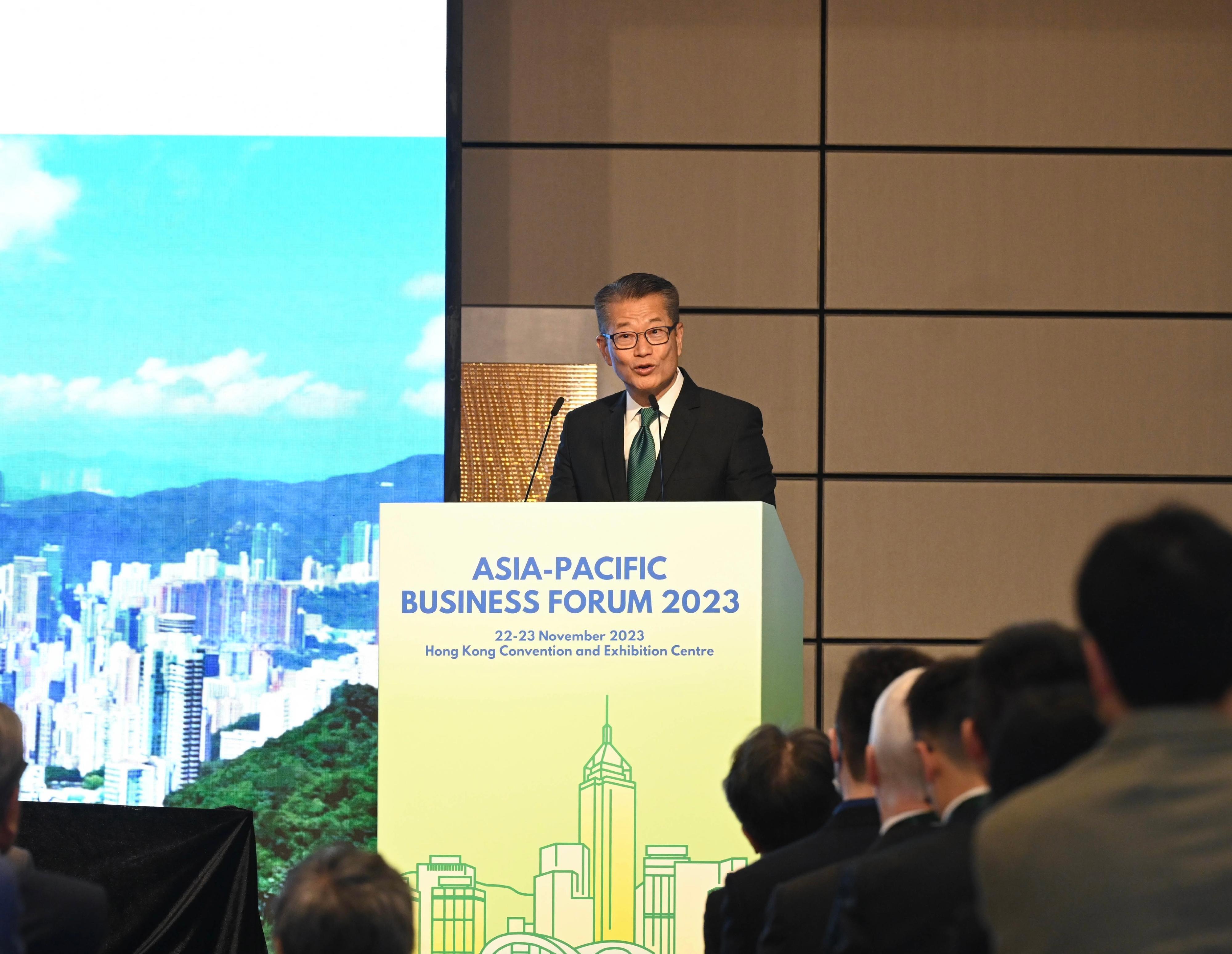 Financial Secretary Paul Chan Mo-po speaks at the Asia-Pacific Business Forum 2023 organized by the United Nations Economic and Social Commission for Asia and the Pacific (ESCAP) and the ESCAP Sustainable Business Network on Nov 22, 2023. (PHOTO / HKSAR GOVERNMENT)
Financial Secretary Paul Chan Mo-po speaks at the Asia-Pacific Business Forum 2023 organized by the United Nations Economic and Social Commission for Asia and the Pacific (ESCAP) and the ESCAP Sustainable Business Network on Nov 22, 2023. (PHOTO / HKSAR GOVERNMENT)
HONG KONG – Hong Kong has come a long way to achieve its goal of carbon neutrality before 2050 as it rises to become a global center for green finance, Financial Secretary Paul Chan Mo-po said Wednesday.
Speaking at the Asia-Pacific Business Forum 2023, Chan noted that more than 60 percent of newly registered private cars in Hong Kong in the first half of 2023 were electric vehicles even as the city phases out coal for daily electricity generation.
“For decarbonization, we have come a long way,” Chan said.
He said the Hong Kong Special Administrative Region government is committed to working with the business sector to realize the city's green transformation, and contribute to regional decarbonization progress.
Chan said the territory will increase the share of zero-carbon energy to 60 to 70 percent by 2035 and achieve net-zero carbon emissions in electricity generation before 2050. The city is also promoting the adoption of hydrogen fuel as zero-carbon energy
Chan noted that electricity generation accounted for two-thirds of Hong Kong’s carbon emissions while transport’s share was 19 percent, and waste, 8 percent.
To achieve carbon neutrality, the city is focusing on net-zero electricity generation, saving energy in buildings, promoting green transport, and reducing waste, Chan said.
ALSO READ: Paul Chan: HK is already Asia's green finance hub
He said the territory will increase the share of zero-carbon energy to 60 to 70 percent by 2035 and achieve net-zero carbon emissions in electricity generation before 2050. The city is also promoting the adoption of hydrogen fuel as zero-carbon energy.
“Through promoting green buildings, improving their energy efficiency, and promoting a green lifestyle, we are on the way to reducing electricity consumption of commercial buildings and residential buildings by 30-40 percent and 20-30 percent respectively by 2050,” Chan said.
He said the city plans to cease new registration of fuel-propelled and hybrid private cars by 2035, or earlier while promoting other new-energy transport. And to reduce waste, Hong Kong is also developing state-of-the-art, waste-to-energy facilities.
“In the next 15 to 20 years, the government will devote about $30 billion to implement the above-mentioned climate-change mitigation and adaptation measures,” Chan said.
ALSO READ: Chan underscores HK's role in global green progress at APEC
“I believe the government’s climate budget will also boost private-sector investment, as companies become increasingly aware of the benefits that green practices can bring,” he added.
Chan said that he was also confident that Hong Kong will also rise as an international center for green finance, noting that the total green and sustainable debt arranged or issued in Hong Kong exceeded $80 billion last year.
“That was up more than 40 per cent, year-on-year,” Chan said, adding that the volume of green and sustainable bonds arranged in Hong Kong accounted for one-third of Asia’s total issuance.
Also speaking at the forum, Guy Bradley, chairman of Swire Pacific and Swire Properties, said stakeholders have heightened their expectations around ESG (environment, sustainability and governance) performance.
“We need to meet and exceed those expectations accordingly,” Bradley said. “ESG should be a part of all businesses’ DNA and needs to be built in to keep processes including risk analysis, evaluating new investments or making strategic decisions.”
Underscoring the need for businesses to actively contribute towards these targets and collaborate with the government to drive the transition towards a greener and more sustainable future, Bradley also expressed unwavering support for the Hong Kong government's ambitious dual carbon targets.
Meanwhile, Secretary for Environment and Ecology Tse Chin-wan said the Environmental Protection Department will expand the community recycling network to strengthen the support for recycling facilities at the district level.
READ MORE: Chan: Green finance will catalyze global cooperation
He told the Legislative Council on Wednesday that 50 new Recycling Stores in public rental housing estates will start operations progressively and the number of public recycling collection points in Hong Kong will be increased to over 220.
The Trial Scheme on Food Waste Collection in PRH Estates has also been extended to 13 public housing estates, covering about 170,000 residents as of mid-September.
“Since the launch of the trial scheme for a year, more than 1,200 tonnes of food waste have been collected, with a daily average of about 5 tonnes. The quantity of food waste collected is in line with our expectations, and over 50 percent of the households in some PRH estates have used the smart recycling bins,” Tse said.


